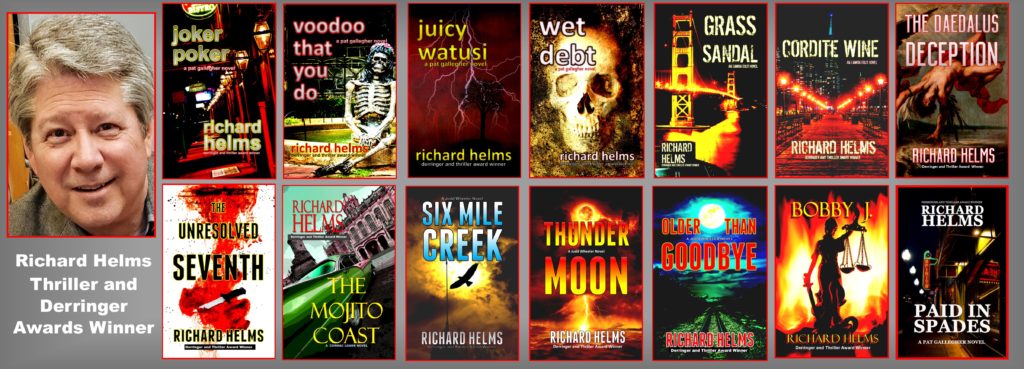 by Richard Helms
by Richard Helms
As I mentioned in last month’s article, on the eve of releasing my nineteenth novel (Paid in Spades, Clay Stafford Books, March 2019), I realized that almost all of my previous novels were completely out of print. Some were available as e-books, but—save for two really awful very early novels parked at iUniverse (where they can do little harm)—none of my titles were available in paper editions.
My task was obvious. All I had to do was re-publish fourteen novels in trade paperback.
In two months.
Easy peasy.
Like the samizdat writers during the early Russian revolution, I also saw an opportunity to improve the original works and bring these books into line with my current skill level. That meant editing and rewriting every one of them. I used Amazon’s KDP paperback program, and designed all the new covers myself using Microsoft Publisher and Dreamstime stock images, most of which I manipulated with lighting and contrast to distort them slightly.
Malcolm Gladwell once claimed that if you spend ten thousand hours at any activity, you become an expert. I’ve been writing seriously since the 1990s, and recently finished the first draft of my twenty-fourth novel. Presuming I spend between three and four hundred hours on each novel (including edits and rewrites), and including all my short stories, I figure I blew through that ten-thousand-hours mark a few years back. Whether I’m an expert can be left for someone else to determine. What is obvious is that I definitely don’t write today the way I did in 1990.
The five most recent novels (Six Mile Creek, Thunder Moon, The Mojito Coast, The Unresolved Seventh, and Older than Goodbye) were all professionally edited by the staff at Five Star/Cengage, so there was little to do to them. It was the older novels—some dating back more than a quarter century—that gave me the biggest headaches. Hackneyed writing, superfluous verbiage, poor syntax, embarrassing clichés—they were all there.
What struck me most strongly was the way I characterized antagonists in my early days. While I always thought that villains should be written as if they believed themselves to be the heroes of their own stories, my early attempts at them still came off as two-dimensional. They had none of the nuances of, say, Shug Burch in my novel Older Than Goodbye.
While rewriting each novel, especially the earlier works, I tried to humanize my antagonists and make them slightly more sympathetic. I know good must triumph over evil in the climax of each novel, but some of my most delightful moments have come when a reader says he or she was a little sad to see the bad guy come to a bad end. Like Jessica Rabbit, they weren’t really bad people, they were just written that way.
As I mentioned in last month’s article, I was one of the poster boys for self-publishing in the early 2000s. However, I haven’t put out a paperback edition of one of my novels since 2006. I anticipated the chore of re-publishing fourteen titles with all the enthusiasm I typically reserve for root canals.
What shocked me, using the KDP process, was exactly how easy Amazon has made the work. In the old days, I had to format the piece in Word, then distill it through Adobe Acrobat to produce commercial print-ready PDF copies. Sometimes it worked, sometimes it didn’t. Today, Microsoft Word 365 does all that for you as soon as you have your Word file ready to go. In fact, it isn’t even necessary to save the original work as a PDF; Amazon converts Word files to print just as easily, and the results look great (as long as the book is properly formatted).
 As for covers, back in the day I had my covers designed by a graphic artist in Vermont who had to produce monster TIFF files in CMYK. Microsoft Publisher stopped offering a CMYK option several iterations ago, so I was grateful to discover that CMYK .tiff files are no longer required. All I had to do was build an RGB cover in Publisher using templates provided by Amazon, and convert them into PDF copies.
As for covers, back in the day I had my covers designed by a graphic artist in Vermont who had to produce monster TIFF files in CMYK. Microsoft Publisher stopped offering a CMYK option several iterations ago, so I was grateful to discover that CMYK .tiff files are no longer required. All I had to do was build an RGB cover in Publisher using templates provided by Amazon, and convert them into PDF copies.
There is no question in my mind that Amazon has made paperback publishing infinitely easier than it was when I ran my own Lightning Source/Ingram-based publishing company fifteen years ago. While the book-dispensing kiosks Jason Epstein (the father of the paperback novel) predicted in 1999 still haven’t become widespread, Amazon has provided the next-best option. You can upload your book today, and it will be listed for sale tomorrow. That’s pretty awesome.
Now, if only the books sold themselves!
Richard Helms’s Thriller Award-winning knight errant Pat Gallegher (Juicy Watusi, Wet Debt) returns in the steamy, action-drenched New Orleans tale in Paid In Spades. Pat Gallegher tales have been nominated for the PWA Shamus Award and SMFS Derringer Award, and have won the ITW Thriller Award. A prolific writer, Helms also pens the San Francisco-based private investigator Eamon Gold and small-town North Carolina police chief Judd Wheeler books.
